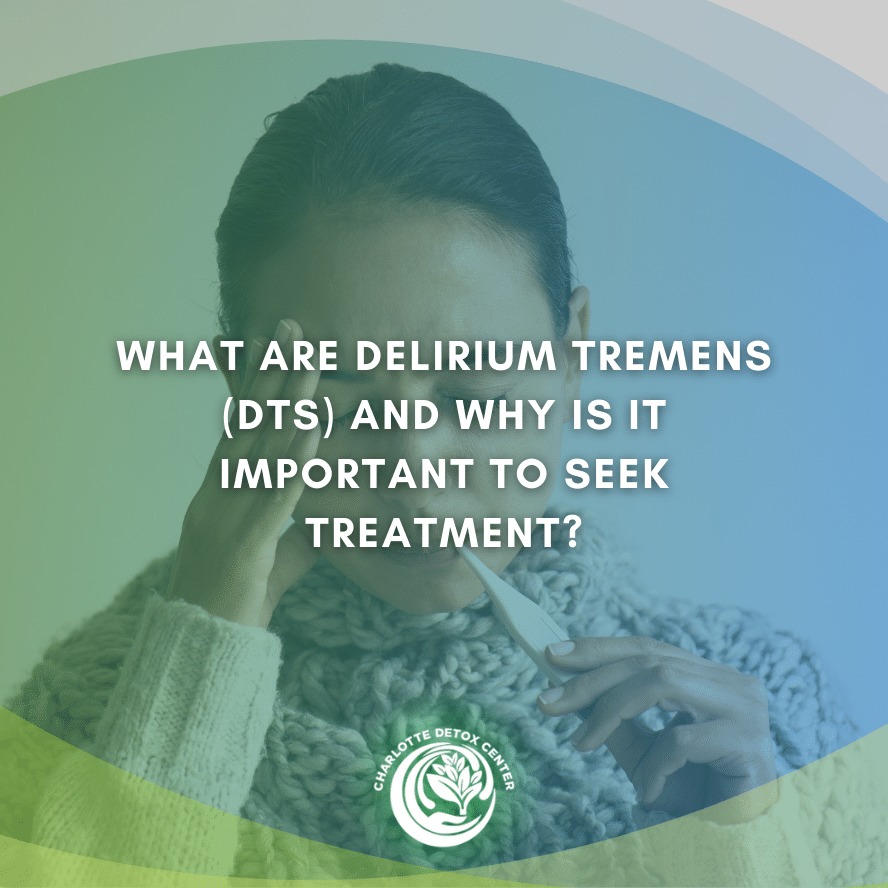What are Delirium Tremens (DTs) and Why is it Important to Seek Treatment?

Medically Verified: 2/1/24
Medical Reviewer
Chief Editor

All of the information on this page has been reviewed and verified by a certified addiction professional.
Most people in the United States have consumed alcohol, with 85.6% of people reporting using the substance at least once in their lifetime.[1] While drinking alcohol on occasion is fine, many people transition from occasional drinking to heavy alcohol abuse. According to the National Institute on Alcohol Abuse and Alcoholism, over 6% of Americans report drinking heavily at least once per month.[1]
When you regularly consume large amounts of alcohol, you are bound to develop alcoholism. If you suffer from alcohol use disorder, your body will become accustomed to the presence of the substance. This means that if you abruptly stop using alcohol, you will experience symptoms of withdrawal because your brain and body believe it needs the substance to operate effectively.
Alcohol withdrawal can range from mild, moderate, and severe depending on your personal relationship with the substance. If you drink heavily frequently, your likelihood of developing severe alcohol withdrawal symptoms is high. Unfortunately, severe alcohol withdrawal can lead to a life-threatening condition known as delirium tremens (DTs).
Understanding Delirium Tremens (DTs)
Delirium tremens is the most severe form of alcohol withdrawal that is characterized by profound confusion, autonomic hyperactivity, and cardiovascular collapse. While more than 50% of people with a history of alcohol abuse experience alcohol withdrawal symptoms, only 3 to 5% of people develop delirium tremens.[2]
This condition develops in people who drank alcohol very heavily for a long time. According to the National Library of Medicine, DTs are most common among individuals who were addicted to alcohol for more than 10 years.[3] Additionally, having a head injury, infection, or illness at the same time as the onset of alcohol withdrawal symptoms increases your risk of developing DTs.
If you are wondering how much you have to drink to develop delirium tremens, it is most common among people who:[3]
- Drank 4 to 5 pints of wine daily and for several months
- Drank 7 to 8 pints of beer daily and for several months
- Drank 1 pint of hard liquor daily and for several months
The Symptoms of Delirium Tremens (DTs)
The onset of delirium tremens is somewhere between 12-48 hours after your last drink. This condition is extremely dangerous, causing a variety of uncomfortable and life-threatening symptoms.
Mild, early symptoms of delirium tremens include:
- Excitement or fear
- Bursts of energy
- Sensitivity to light, sound, and touch
- Extreme sleepiness
- Fatigue
The dangerous and life-threatening symptoms of delirium tremens include:
- Delirium (severe confusion)
- Visual and auditory hallucinations
- Nausea and vomiting
- Dehydration
- Chest pain and rapid heartbeat
- Fever
- Changes in mental functioning
- Seizures
The seizures associated with delirium tremens can be life-threatening. It is most common for people to experience generalized tonic-clonic seizures. This type of seizure affects the entire body, leading to hallucinations, dizziness, violent muscle contractions, and loss of consciousness. This is one of the many reasons that you should always attend a professional detox program before attempting to quit using alcohol.
Prevention and Treatment of Delirium Tremens
Seeking professional help for alcoholism is extremely important, as conditions like delirium tremens are preventable with proper and prompt medical treatment. An alcohol detox center can help you to recover from alcohol withdrawal with minimal complications. In other words, you can prevent yourself from developing delirium tremens by choosing to detox at a medical facility instead of attempting to detox from alcohol at home.
During a medical detox program, you will be prescribed medications that soothe symptoms of withdrawal and prevent alcohol cravings. Benzodiazepines are commonly used to prevent alcohol withdrawal symptoms such as heightened anxiety, agitation, shakes and tremors, and seizures.[4] They can also prevent DTs from developing, keeping you comfortable and safe throughout the detoxification process.
Unfortunately, not everyone can access a detox program before they stop consuming alcohol. If you find that you are experiencing the symptoms of delirium tremens, you must seek medical treatment immediately.
Delirium tremens is treated by the following procedures:
- Admittance into a hospital where blood chemistry, bodily fluid levels, and vital signs can be closely monitored
- Benzodiazepines calm your excited nervous system, lessening symptoms of withdrawal and preventing seizures
- IV fluids with vitamins and minerals to treat dehydration and balance electrolytes
- Antipsychotic medications to stabilize your mood and prevent hallucinations
- Blood pressure medications and drugs to regulate your heartbeat
Because delirium tremens have a mortality rate of up to 37% without proper treatment, attending a professional medical detox program or hospital is of the utmost importance.[2]
Finding Help for Alcoholism and Alcohol Withdrawal
Alcoholism is a chronic and progressive disease that can result in an array of long-term consequences. Because delirium tremens is a possible risk associated with alcohol withdrawal syndrome, you should always attend a medical detox program rather than attempting to overcome the symptoms of withdrawal on your own.
Charlotte Detox Center is a top-rated alcohol detox center in North Carolina that can help you remain safe and comfortable throughout the withdrawal process. Contact us today for more information on how to get started.
References:
